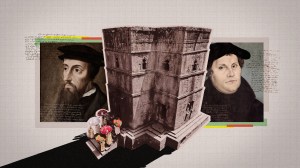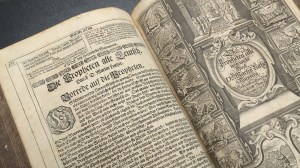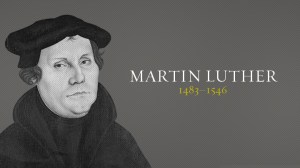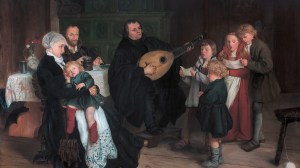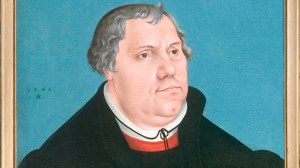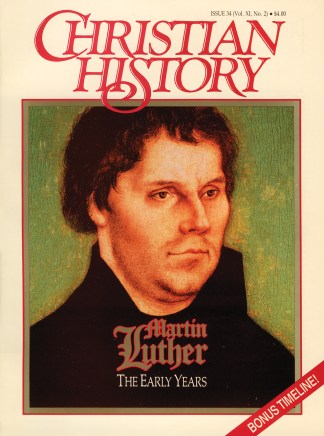In this series

One day in 1511, Luther and his monastic mentor, Johann von Staupitz, sat under a pear tree in a garden near their cloister at Wittenberg. The vicar-general told young Luther he should become a professor of theology and preacher. Luther was taken aback. “It will be the death of me!” he objected.
“Quite all right,” said Staupitz. “God has plenty of work for clever men like you to do in heaven!”
Luther did receive his doctor’s degree—just over a year later, on October 18, 1512. That day he also received a woolen beret, a silver ring, two Bibles (one closed, the other open), and a commission to be a “sworn doctor of Holy Scripture.” He took that commission seriously. It guided his theology and his career as a reformer. Years later he declared, “What I began as a Doctor, I must truly confess to the end of my life. I cannot keep silent or cease to teach.” In his view, the Reformation happened because the pope tried to hinder him from fulfilling his vocation of expounding the Scriptures.
Dying to Be a Theologian
Though he held a doctor’s degree, Luther was no mere member of the learned guild of scholastic theologians. His theology grew out of his anguished quest for a gracious God. For Luther, theology was not simply the academic study of religion. Rather, it was a lifelong process of struggle and temptation. As Luther never tired of saying, only experience makes a theologian. “I did not learn my theology all at once,” he said, “but I had to search deeper for it, where my temptations took me. … Not understanding, reading, or speculation, but living—nay, dying and being damned—make a theologian.”
Out of Luther’s struggles emerged a theology that shook the foundations of medieval Christendom. Though Luther appreciated the protests made by such forerunners as John Wycliffe of England and John Hus of Bohemia, he recognized his own efforts as qualitatively different. “They attacked the life,” he said. “I attack the doctrine.”
For example, Luther’s protest against Tetzel’s sale of indulgences in 1517 did more than call for church reform. It challenged the church’s identity. In this sense, Luther emerged as the most radical of all sixteenth-century reformers. His radical views can be crystallized in three statements on Scripture, faith, and grace.
Sola Scriptura: Scripture Alone
At the Diet of Worms in 1521, Martin Luther declared his conscience captive to the Word of God. But that declaration did not mark his decisive theological break with the Church of Rome. That had happened two years earlier, in July 1519, at Leipzig.
Luther’s opponent in the Leipzig Debate was an accomplished professor at the University of Ingolstadt, John Eck. In German, Eck means corner, and he boxed Luther into one. He forced Luther to admit that popes and church councils could err, and that the Bible alone could be trusted as an infallible source of Christian faith and teaching.
Under duress, Luther articulated what would come to be the formal principle of the Reformation: all church teaching must be normed by the Bible. The following year, in The Babylonian Captivity of the Church, Luther stated: “What is asserted without the Scriptures or proven revelation may be held as an opinion, but need not be believed.” Late medieval theologians placed Christian tradition alongside the Bible as a source of church doctrine. Luther emphasized instead the primacy of Scripture.
However, Luther did not reject tradition outright. He respected the writings of the early church Fathers, especially those of Augustine, and he considered the universal statements of faith, such as the Nicene and Athanasian Creeds, binding on the church in his day. But all creeds, sayings of the Fathers, and decisions of church councils must be judged by—never sit in judgment upon—the “sure rule of God’s Word.”
For Luther, the church does not take priority over the Bible; instead, the church is the creation of the Bible. It is born in the womb of Scripture. “For who begets his own parent?” Luther asked. “Who first brings forth his own maker?”
Arguably, Luther’s greatest contribution to the Reformation was his translation of the Bible into German. He wanted common people—the farm boy and milkmaid—to “feel” the words of Scripture “in the heart.”
Luther held a high view of the inspiration of the Bible, calling it once “the Holy Spirit book.” But what truly distinguished his exegesis was his ability to make the text come alive. For him, Bible stories were not distant historical acts but living current events, as we see in his treatment of Gideon: “How difficult it was for [Gideon] to fight the enemy at those odds. If I had been there, I would have messed in my breeches for fright!” Thus, for Luther, the Bible is no mere depository of doctrine. In it, a living God confronts his people.
Sola Fide: Faith Alone
Martin Luther developed his understanding of justification amid the moralism and mysticism of late medieval religion. He made strenuous efforts to find a gracious God, doing penance according to the dictates of scholastic theology. Ultimately he became frustrated to the point of despair.
Luther’s “discovery of the gospel,” as it has been called, came during his scholarly labors as a Doctor in Biblia. The pivotal text was Romans 1:17. “At last, as I meditated day and night on the relation of the words ‘the righteousness of God is revealed in it, as it is written, the righteous person shall live by faith,’ I began to understand that ‘righteousness of God’ as that by which the righteous person lives by the gift of God; and this sentence, ‘the righteousness of God is revealed,’ to refer to a passive righteousness, by which the merciful God justifies us by faith, as it is written, ‘the righteous person lives by faith.’ This immediately made me feel as though I had been born again, and as though I had entered through open gates into paradise itself. From that moment, I saw the whole face of Scripture in a new light. … And now, where I had once hated the phrase, ‘the righteousness of God,’ I began to love and extol it as the sweetest of phrases, so that this passage in Paul became the very gate of paradise to me.”
Luther considered justification by faith “the summary of all Christian doctrine” and “the article by which the church stands or falls.” In the Smalkald Articles of 1537 he wrote: “Nothing in this article can be given up or compromised, even if heaven and earth and things temporal should be destroyed.”
According to the medieval understanding of justification, which was derived from Augustine, a person gradually receives divine grace, eventually healing sin’s wounds. But in his mature doctrine of justification, Luther abandoned the medical image of impartation for the legal language of imputation: God accepts Christ’s righteousness, which is alien to our nature, as our own. Though God does not actually remove our sins—we are at the same time righteous and sinful (simul justus et peccator)—he no longer counts them against us.
To use Luther’s words, it is a “sweet exchange” between Christ and the sinner: “Therefore, my dear brother, learn Christ and him crucified; learn to pray to him despairing of yourself, saying ‘Thou, Lord Jesus, art my righteousness and I am thy sin. Thou hast taken on thyself what thou wast not, and hast given to me what I am not.’”
Medieval theologians considered faith one of the three theological virtues, along with hope and love. They emphasized faith’s cognitive content and saw it as a virtue formed by love. But to Luther, such faith is not sufficient for salvation. (Even demons have it, Paul wrote.) Truly justifying faith—fiducia, Luther called it—is something more. It means taking hold of Christ, hearing and claiming God’s promise, and apprehending our acceptance by God in Jesus Christ.
Sola Gratia: Grace Alone
Moderns often see Luther as the apostle of human freedom and the father of rugged individualism. But this view misunderstands his theological “Copernican revolution.” Copernicus’ calculations removed earth—and thus, humanity—from the center of created reality. Likewise, Luther’s theology changed humanity’s place in the process of salvation.
For Luther, salvation was anchored in the eternal inscrutable purpose of God. Luther anticipated the human-centeredness of later Protestant piety and guarded against it by insisting that God’s grace comes from outside ourselves. Faith is not a human possibility, nor a dimension of the religious personality; it is a radical and free gift of God.
“This is the reason why our theology is certain,” Luther explained. “It snatches us away from ourselves and places us outside ourselves, so that we do not depend on our own strength, conscience, experience, person, or works but depend on that which is outside ourselves, that is, on the promise and truth of God, which cannot deceive.”
Luther’s doctrine of divine sovereignty in human salvation came to fullest expression in his famous debate with Erasmus over grace, free will, and predestination. For Erasmus, humans, though fallen, remain free to respond to grace and thus cooperate in their salvation.
Luther, however, saw the human will enslaved by sin and Satan. We think we are free, he contended, but we only reinforce our bondage by indulging in sin. Grace releases us from this enslaving illusion and leads us into “the glorious liberty of the children of God.” God wants us to love him freely. But that is only possible when we have been freed from captivity to Satan and self.
Solo Christo: Christ Alone
Like later reformer John Calvin, Luther believed that dogmatics (the study of religious dogma) could not be divorced from polemics (the art of argumentation). The gospel was besieged by foes without and within the Christian church. It could be set forth, then, only in opposition to competing claims.
Each sola faced an enemy: Scripture alone, against Scripture subordinated to a false understanding of tradition; faith alone, against works-dependent righteousness; and grace alone, against a theology of human merit.
Stated positively, each sola affirmed the centrality of Jesus Christ. Christ is the sole content of Scripture and the principle for selectivity within Scripture. Luther criticized the Epistle of James because it did not proclaim Christ sufficiently. “Whatever does not teach Christ is not apostolic, even though St. Peter or St. Paul does the teaching,” he wrote. “Again, whatever preaches Christ would be apostolic even if Judas, Annas, Pilate, and Herod were doing it!”
Christ is the center of Luther’s doctrine of justification by faith. Through Christ’s substitutionary death on the cross God has acted to redeem fallen humanity. In his Large Catechism, Luther writes, “We could never come to recognize the Father’s favor and grace were it not for the Lord Christ, who is a mirror of the Father’s heart.”
Likewise, the doctrine of grace can be approached only through the cross, through the “wounds of Jesus” to which Staupitz had directed the young Luther in his early struggles. As Luther advised Barbara Lisskirchen, a woman who worried she was not among God’s elect, “The highest of all God’s commands is this, that we hold up before our eyes the image of his dear son, our Lord Jesus Christ. Every day he should be the excellent mirror wherein we behold how much God loves us and how well, in his infinite goodness, he has cared for us in that he gave his dear Son for us. … Contemplate Christ given for us. Then, God willing, you will feel better.”
Luther’s legacy does not lie foremost in the saintliness of his life. His warts were many; his vices sometimes were more visible than his virtues. Luther’s true legacy is his insight into the gracious character of God. “What else was Luther,” asked Karl Barth, “than a teacher of the Christian church whom one can hardly celebrate in any other way but to listen to him?”
Dr. Timothy George is the founding dean of Beeson Divinity School at Samford University in Birmingham, Alabama. A member of Christian History’s editorial advisory board, he is the author of Theology of the Reformers (Broadman, 1988).]
Copyright © 1992 by the author or Christianity Today/Christian History magazine.Click here for reprint information on Christian History.


